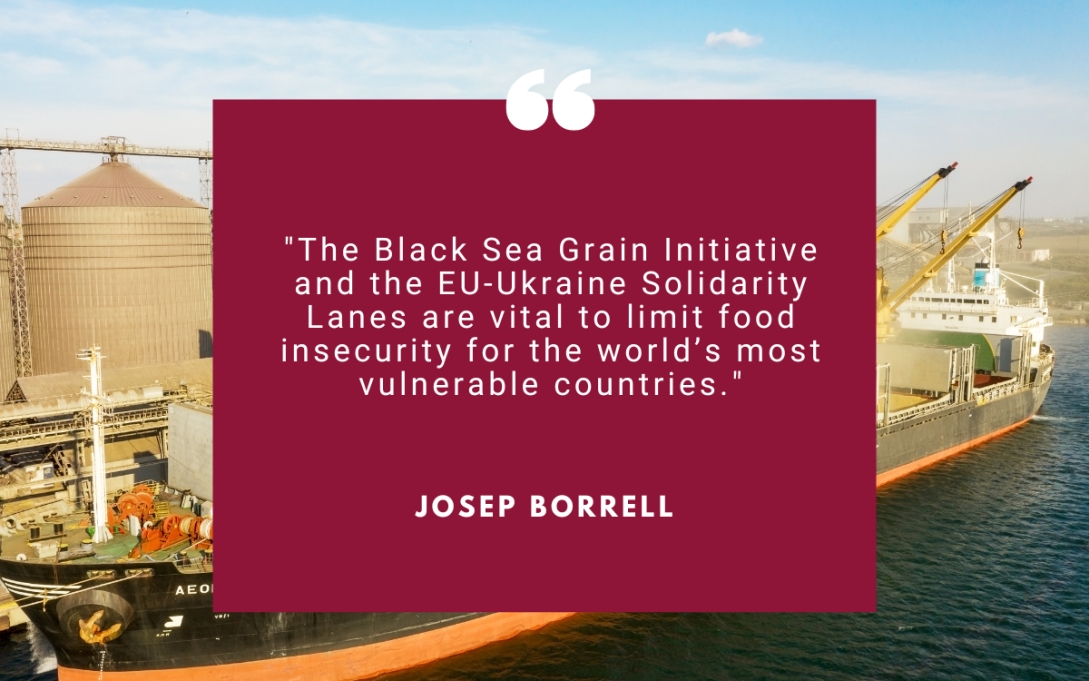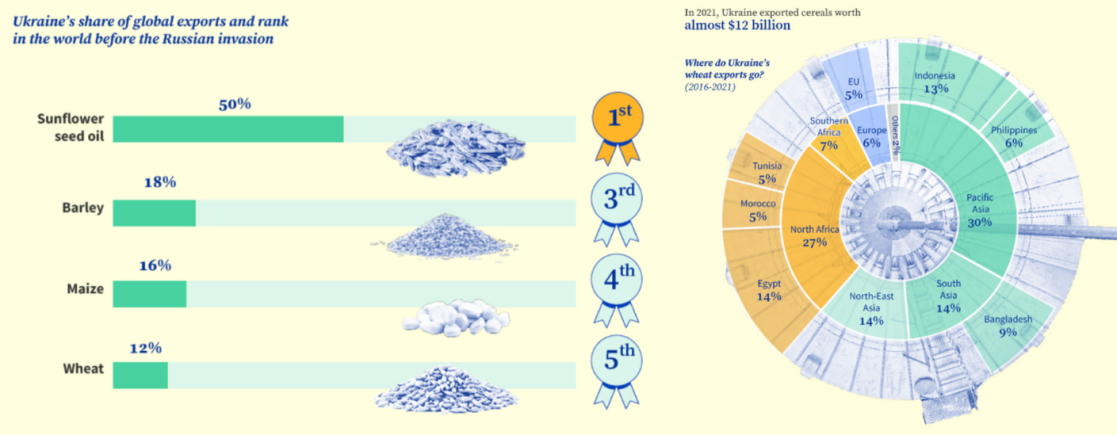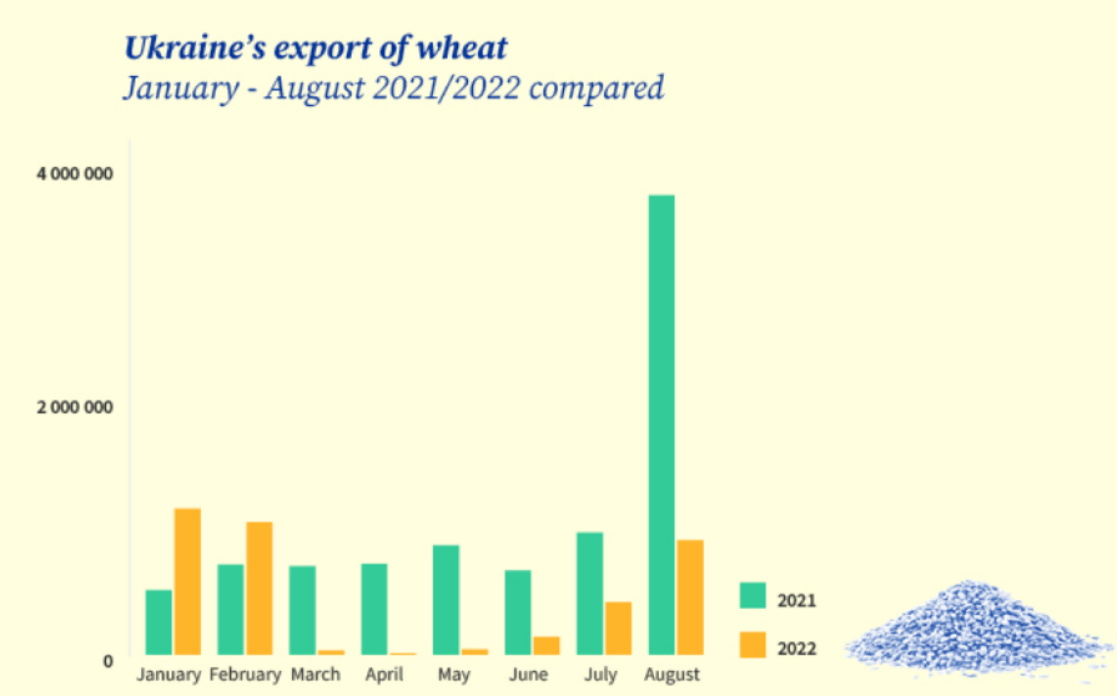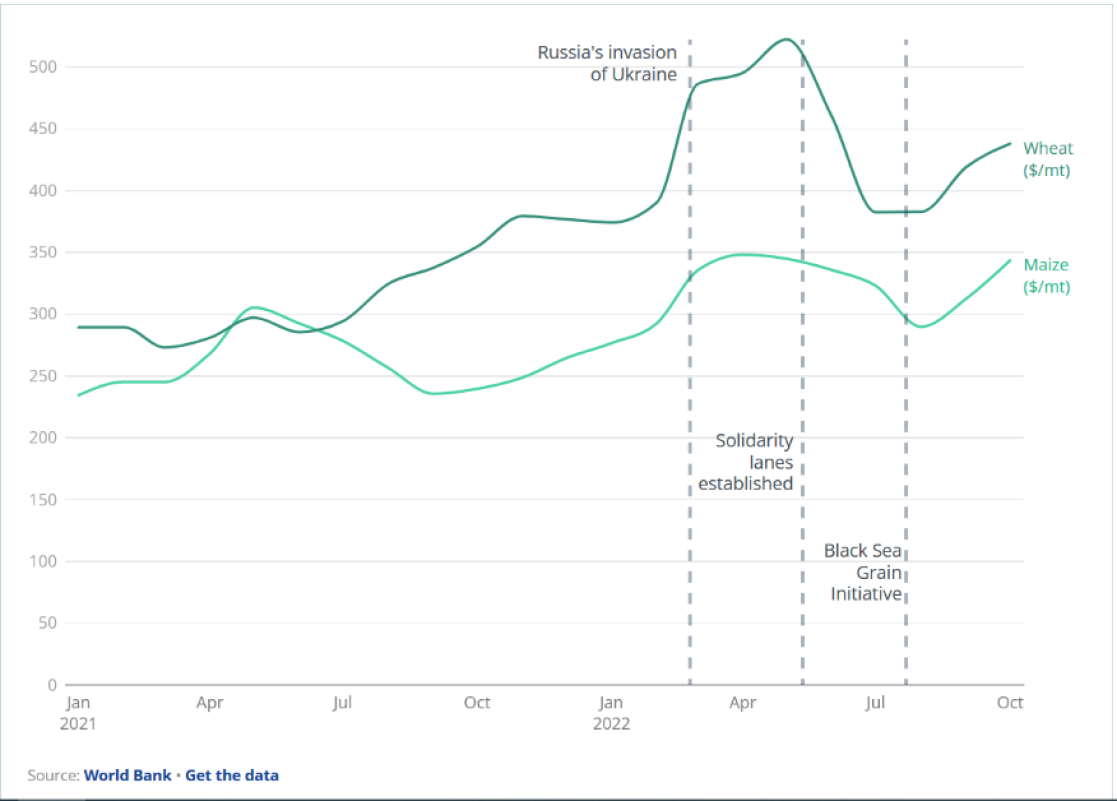The fight continues against the food insecurity that Russia’s war is creating

Before Russia’s war of aggression, Ukraine was one of the world's leading exporters of agricultural products: the first one for sunflower seed oil, the fourth for maize and the fifth for wheat. And these exports were mainly destined for countries in the Global South: in 2021, 27 % of Ukrainian wheat went to North Africa and 58 % to Asia.

Ukraine used to supply around 45 million tonnes of grain to the global market every year, mostly by ships. Since the start of Russia’s war on 24 February, Russian armed forces have systematically targeted crops, farms, silos and transport infrastructures to limit Ukraine’s capacity to produce and export agricultural products. Russian fleet deliberately blocked safe passage to and from Ukrainian Black Sea ports.
“Russia’s war of aggression against Ukraine has contributed substantially to create food insecurity globally and put the livelihoods of millions of people at risk.”
This has contributed substantially to driving up world cereals prices, creating food insecurity globally and putting the livelihoods of millions of people at risk. It has severely affected the activities of the United Nations World Food Programme, which was buying half of its grain stock from Ukraine before the war. I recently visited Somalia and have seen first-hand the severity of the food insecurity caused by the cumulative effects of climate change and the war in Ukraine in that part of the world.

 The crucial role of the Solidarity Lanes
The crucial role of the Solidarity Lanes
In response to Russia’s unacceptable weaponization of food, two successful initiatives were taken. Last May, the European Commission and bordering EU member states established the EU-Ukraine Solidarity Lanes to facilitate and accelerate land freight transport between Ukraine and the EU and, in July, the United Nations and Türkiye brokered an agreement to open a safe maritime humanitarian corridor in the Black Sea (the Black Sea Grain Initiative).
Since the start of the Solidarity Lanes, more than 15 million tonnes of Ukrainian agricultural goods have been exported by road, rail and through Romanian Black Sea and Danube ports. These lanes are currently also the only option for the export of non-agricultural Ukrainian goods and for importing goods that Ukraine needs, such as fuel and humanitarian assistance. As such, they have become the lifeline of Ukraine's economy, bringing back more than €15 billion of much-needed income to Ukrainian farmers and businesses.
“EU-Ukraine Solidarity Lanes have become the lifeline of Ukraine's economy, bringing back more than €15 billion of much-needed income to Ukrainian farmers and businesses.”
EU member states bordering Ukraine (Poland, Romania, Slovakia and Hungary) have made big efforts and investments to facilitate these trade routes. By establishing a more stable connectivity with the EU, the Solidarity Lanes have become an indispensable link with Ukraine and the Republic of Moldova, which is also important in view of their accession process to the EU.
€1 billion mobilised to improve the EU-Ukraine Solidarity Lanes
However, these lanes have capacity limits, bottlenecks persist and logistics costs are high. The European Commission will dedicate €250 million of grants to sustain and further increase their capacity. In the short-term, it will support quick improvements to reduce waiting times and improve movement through the border crossing points and their access routes. To go further, the EU will mobilise €1 billion in total until the end of 2023, with the European Investment Bank (which will lend €300 million for this project), the European Bank for Reconstruction and Development (€300 million), and the World Bank ($ 100 million) to ensure liquidity for operators and funding for repairs and capacity increases.
The Black Sea Grain Initiative
Moreover, since July 2022, when the Black Sea Grain Initiative was agreed, over 400 ships with grain and other foodstuffs have left the Ukrainian ports of Chornomorsk, Odesa and Yuzhny/Pivdennyi. As of 7 November 2022, over 10 million tonnes have been exported via this initiative. Over 40% of the cargo was maize, the grain most affected by blockages in Ukrainian granaries at the beginning of the war (75% of the 20 million tonnes of grain stored). It had to be moved quickly to make space for wheat from the summer harvest.
Contrary to Russian propaganda, half of all agricultural products (two-thirds of wheat and three-quarters of sunflower oil) exported through the Black Sea Initiative went to developing countries. The World Food Programme has restarted shipping wheat from Black Sea ports. So far, five ships carrying a total of over 150,000 tonnes of wheat have left Ukrainian ports for Ethiopia, Yemen, Djibouti, Somalia and Afghanistan.

Right after Russia’s invasion of Ukraine and the Russian blockade of Ukrainian agricultural products exports, prices of wheat and maize rose sharply and maintained high levels until May 2022. At the end of May, when Solidarity Lanes were established, the prices started to drop. Both the lanes and the Black Sea Grain Initiative have had a very positive impact. However, export levels remain significantly lower than in previous years and prices are still above pre-war levels. In September and October, due to Russia's announcement of its intention to end the Black Sea Grain Initiative, prices started to rise again. That is why it was so crucial for this initiative to be extended.

It is obvious that it is Russia’s war of aggression against Ukraine and its deliberate targeting of Ukrainian agricultural facilities and export routes that have exacerbated the food price spike and the global food crisis. However, Russia continues to manipulate information and spread propaganda accusing our sanctions. These are blatant lies. We have always been clear that our sanctions do not target the trade in agricultural and food products, including grain and fertiliser, between Russia and third countries.
“Only the withdrawal of Russian troops from Ukrainian territory and the cessation of Russian aggression can enable Ukraine to produce and export the agricultural products that a world of 8 billion people needs urgently.”
The Solidarity Lanes and the Black Sea initiative are of course of crucial importance to limit the risk of a global famine, but they cannot solve the food crisis alone. Only the withdrawal of Russian troops from Ukrainian territory and the cessation of Russian aggression, in accordance with the decisions of the United Nations General Assembly, can enable Ukraine to produce and export the quantities of agricultural products that a world of 8 billion people needs urgently. The Russian aggression is not only a crime against Ukraine and Ukrainians and a blatant violation of the core principles of the UN Charter; it also puts in danger the life of millions of people in the poorest countries of the world. Food should never be used as a weapon of war.
